At the 2025 SMM (2nd) Southeast Asia Automotive Supply Chain Conference hosted by SMM, Songwut Apirakkhit, Executive Director of the Next-Generation Automotive Sector at the Eastern Economic Corridor (EEC), shared insights on the topic "Eastern Economic Corridor (EEC): Where Prosperity Begins."
Eastern Economic Corridor (EEC)
The Eastern Economic Corridor (EEC) is the core of Thailand's 4.0 development strategy, aiming to restructure and revitalize the Thai economy.
"Creating an Inclusive Environment"
Launch in 2017: The Royal Thai Government launched the Eastern Economic Corridor (EEC) initiative in 2017, a regional development project dedicated to revitalizing Thailand's renowned eastern seaboard.
Covered Areas: The initiative encompasses three key provinces in the east: Rayong, Chonburi, and Chachoengsao.
Development Goals: The goals are to promote modern and environmentally friendly economic activities, provide comprehensive government services, establish efficient infrastructure and public facilities, plan land use rationally, and develop modern cities suitable for living and doing business.
EECO Investment Promotion Mechanism
Targeted Investments: Regions (EEC Promotion Zones); Industries (5 Clusters)
Tailored Incentives
Integrated Solutions for Startup Operations
5 Key Industry Clusters
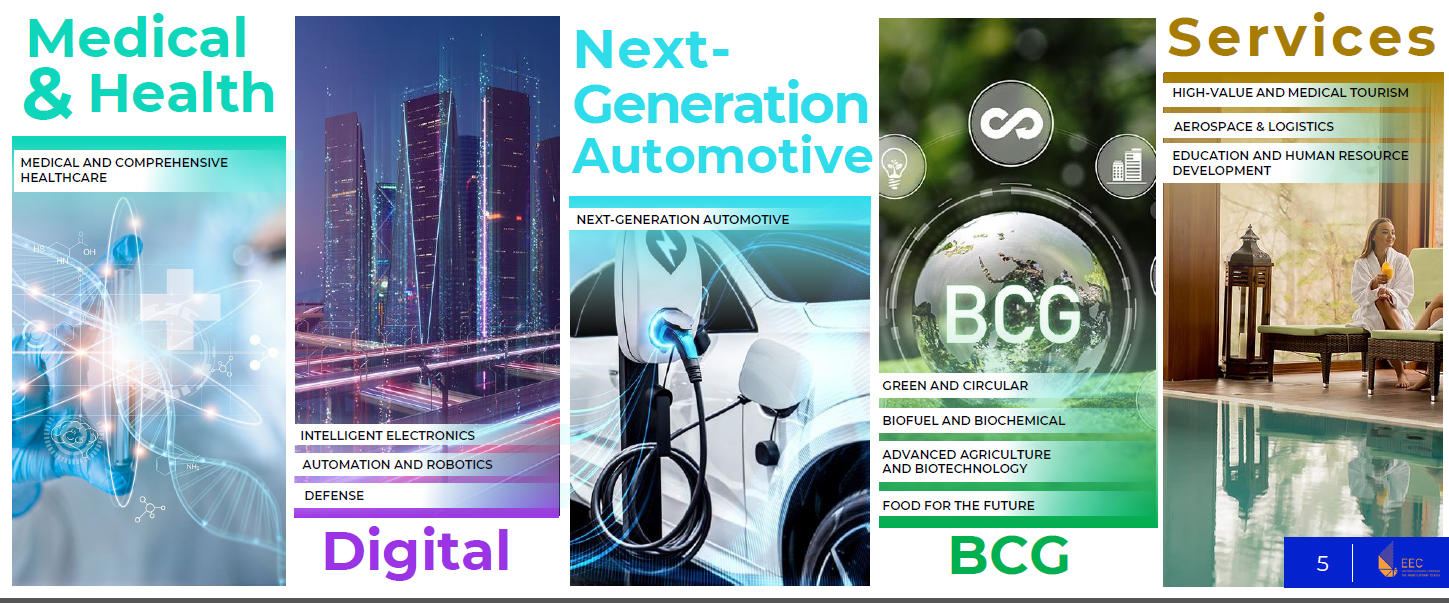
EEC Investment Promotion Certificates Issued (by Nationality) from 2018 to 2024
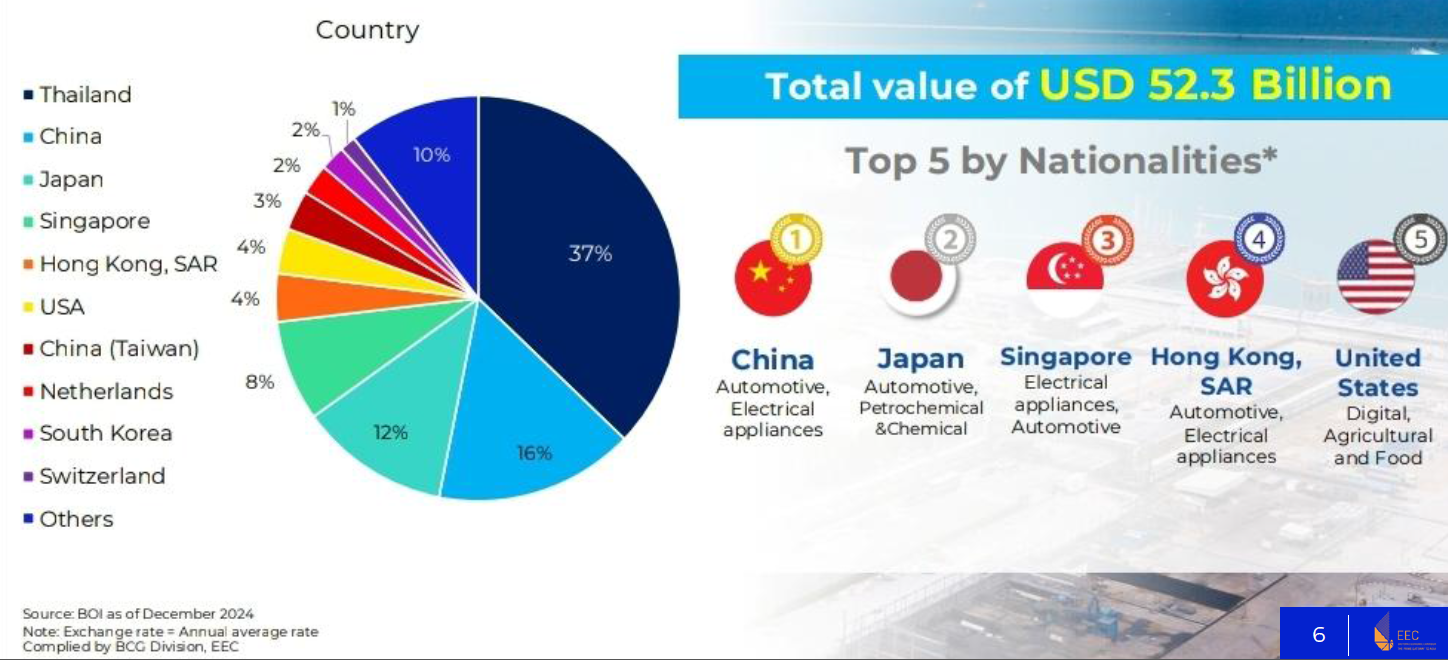
Why Invest in the EEC?
Land Resources
Special Economic Promotion Zones: Over 37 zones are actively promoting economic development.
Workforce
Demand-Driven Human Capital Management: The labour market is becoming increasingly demand-oriented, enhancing the efficiency of human resource management.
Logistics and Infrastructure
National Gateway: Equipped with three international airports (DMK, BKK, UTP) and multiple main ports, including container ports (LCB) and industrial ports (MTP).
Regional Accessibility:
Roads: Including the Burapha Withi Expressway and intercity highways, as well as a road network from national to local levels.
Railways: Offering passenger and freight services.
Utilities: Covering water resources, electricity, and telecommunications supply.
Laws and Regulations
Eastern Special Development Zone Act (2018 AD): The legal framework provides strong support for regional development.
EEC Promotion Zone
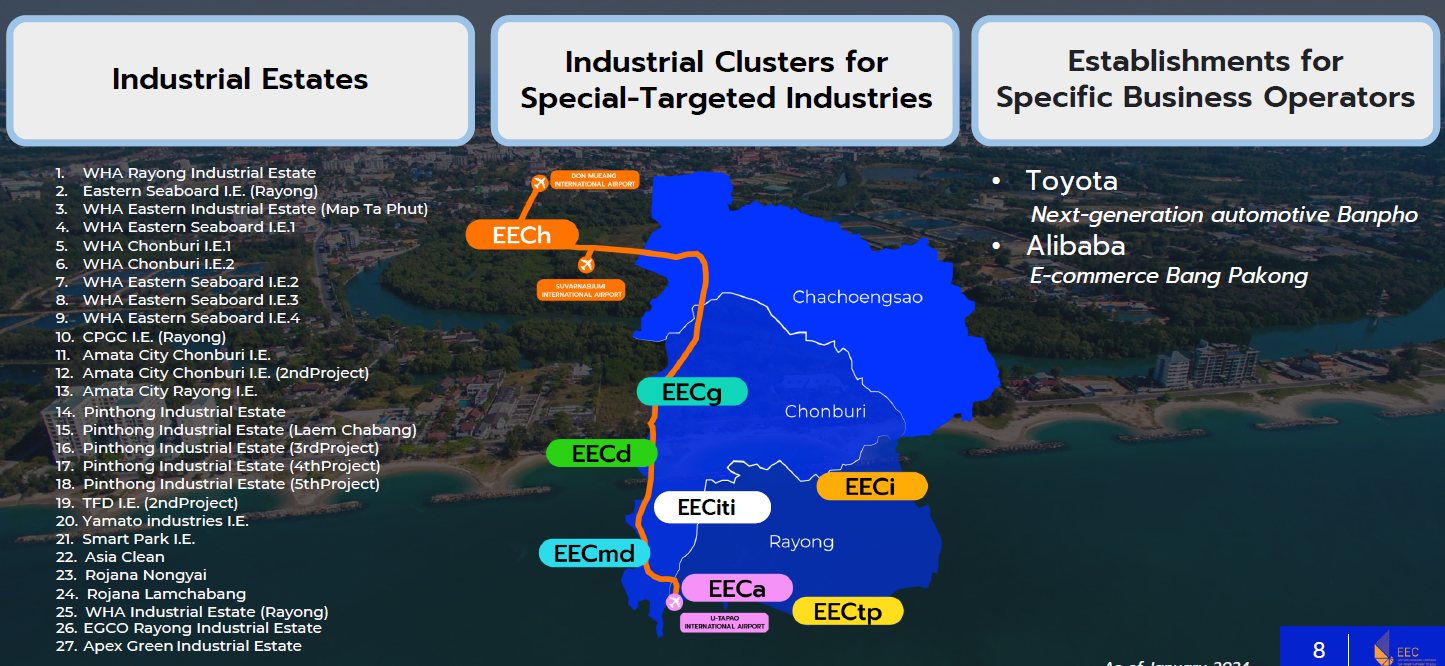
Demand-driven human capital and skills development approach to provide a workforce that meets industry needs (EEC Model)
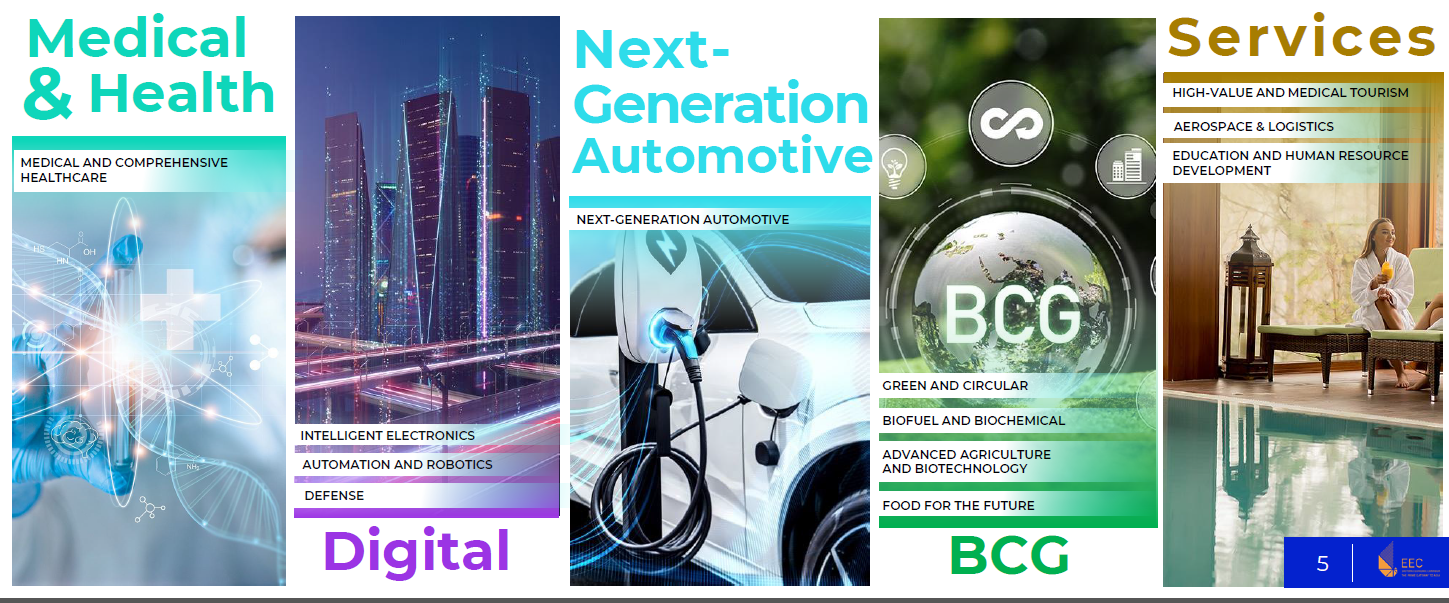
EEC Key Infrastructure Projects
EEC Investor Journey
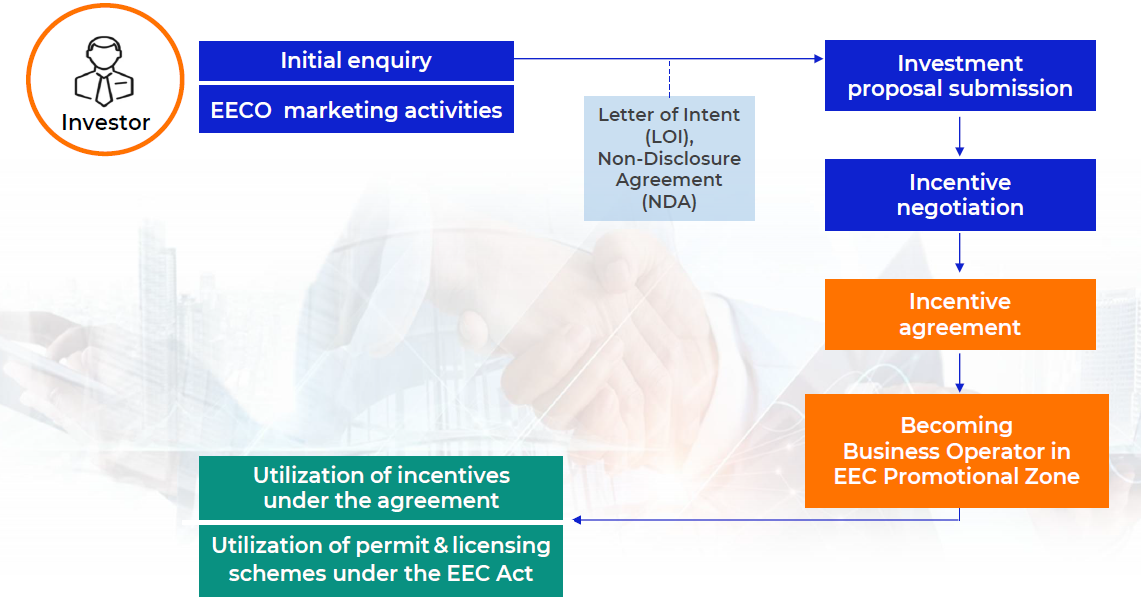
Guidelines on the Scope of EEC Investment Incentives
Strategic considerations are as follows:
1. Nature of the business, whether it is a business in a specific target industry under the EEC Act or related to or beneficial for the development and promotion of a specific target industry;
2. The importance of the business to the supply chain, value chain, or ecosystem of a specific target industry;
3. Pioneer in the Thai industry
Economic considerations are as follows:
1. Investment plan and timetable for starting operations;
2. Amount of investment, the actual investment amount in the Eastern Economic Corridor;
3. Use of local resources or impact on domestic industries;
4. Level of technology used in business operations;
5. Knowledge and technology transfer plan;
6. R&D activities involved;
7. Employment or involvement of local workforce
Environmental considerations:
1. Sustainability of business operations
2. Contribution to greenhouse gas reduction/carbon neutrality/net-zero emissions
Social considerations are as follows:
Participation in local community development and support
EEC Investment Incentives
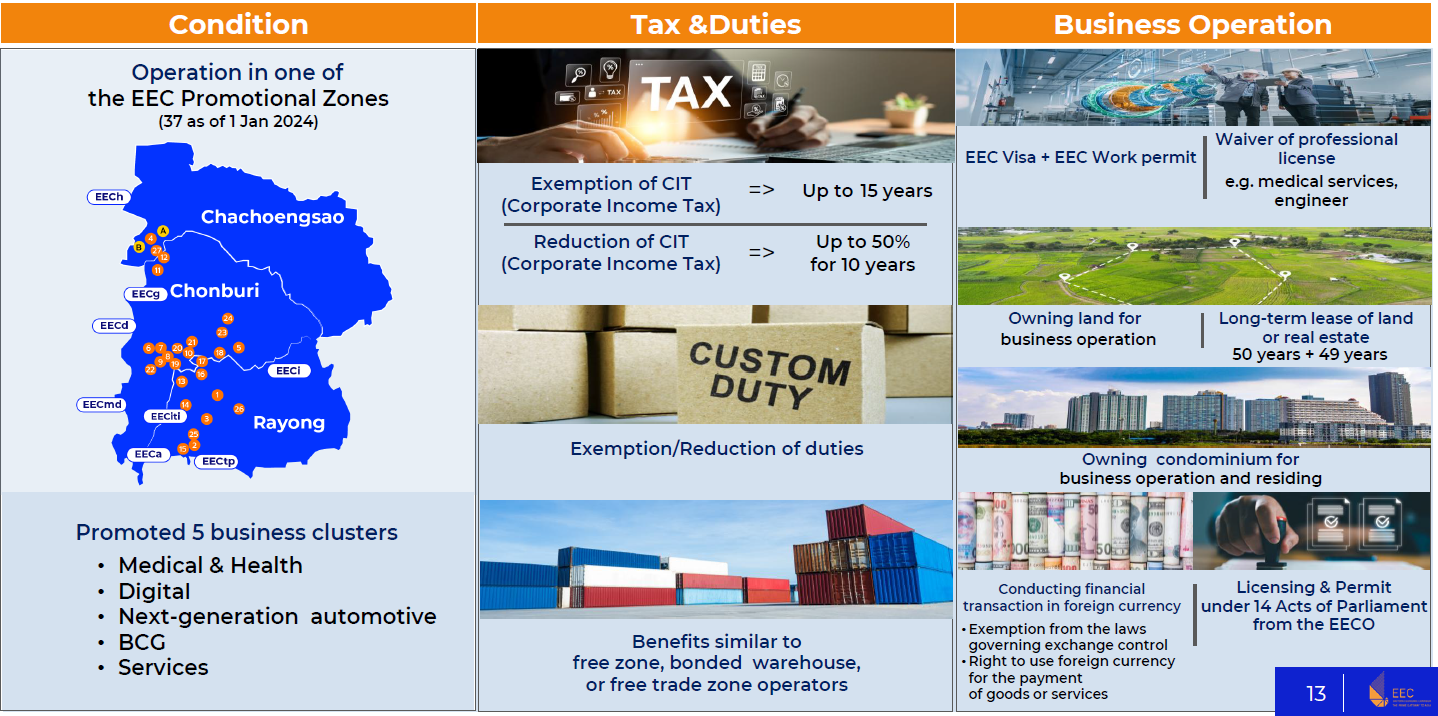
Incentive Framework
Tax Privileges (1/3)
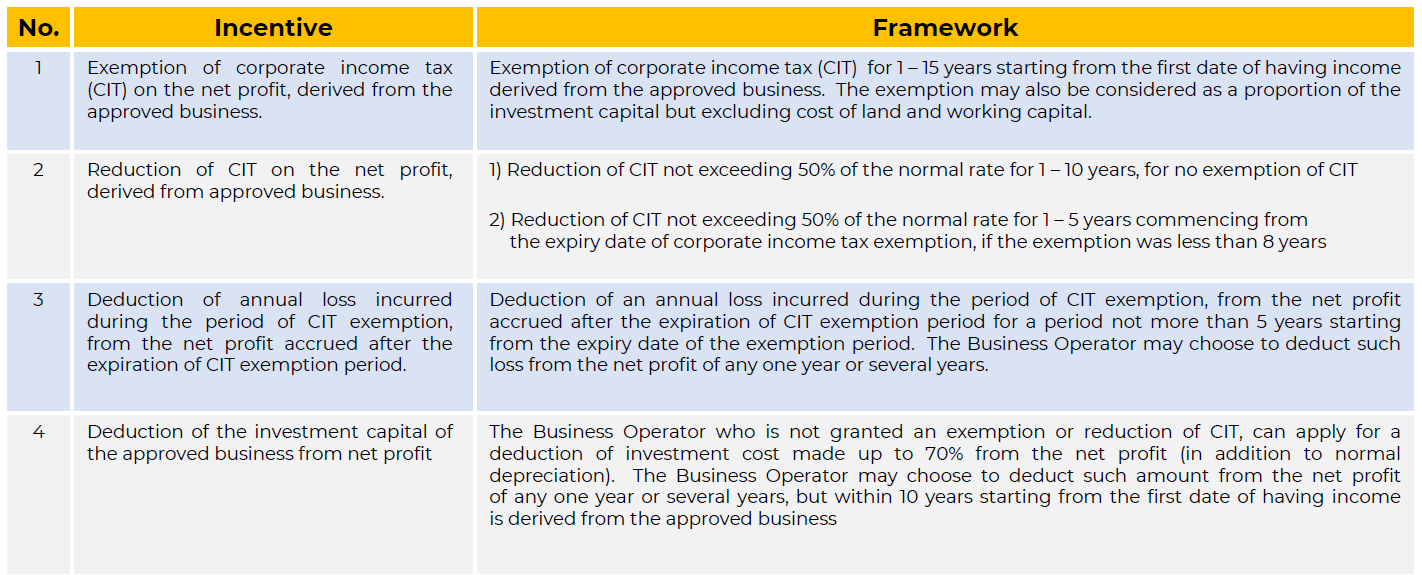
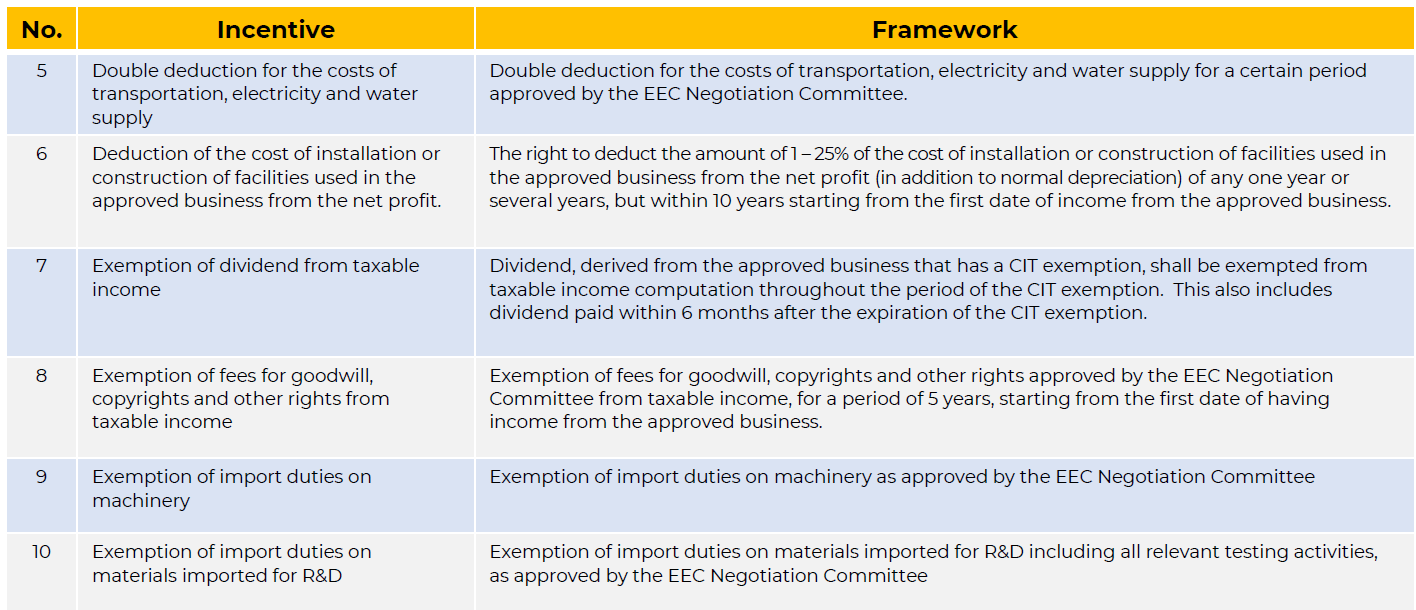
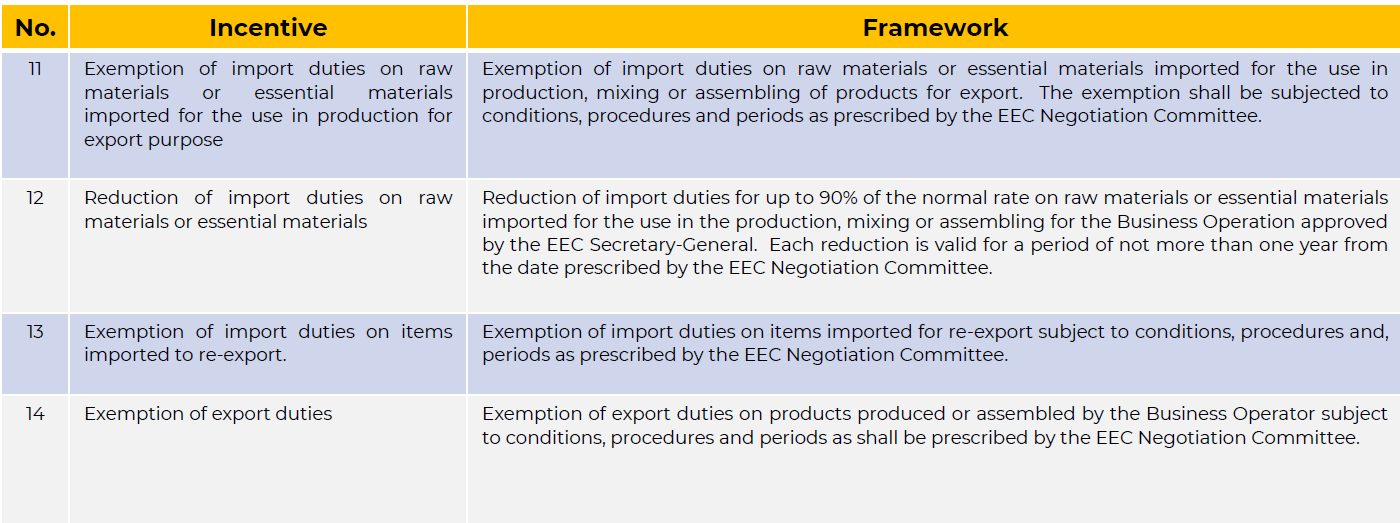
Incentive Framework:
Non-incentive measures:
Land Ownership (Promotion Zone): The land ownership within the EEC Promotion Zone for conducting approved businesses is subject to the deliberation and decision of the EEC Negotiation Committee.
Condominium Ownership:The condominium ownership within the EEC area for business operations or residence is subject to the deliberation and decision of the EEC Negotiation Committee.
Entry and Residence Rights for Workforce:Enterprises have the right to bring in foreign professionals, executives, and their spouses and dependents for entry and residence, with the number and duration subject to the approval of the EEC Secretary General.
EEC Work Permit Rights:Enterprises within the EEC Promotion Zone may apply for work permits issued by the EEC Secretary General for the foreign professionals and executives they bring in.
Exemption from Foreign Exchange Control Laws:The right to be exempt from foreign exchange control laws, in accordance with the criteria and conditions set by the EEC Policy Committee.
Payment for Goods or Services in Foreign Currency:Operators have the right to pay for goods or services in foreign currency within the EEC Promotion Zone, in accordance with the criteria and conditions set by the EEC Policy Committee.
Legal rights and benefits related to competitiveness enhancement: Applicants can apply to the Thailand Board of Investment for the National Competitiveness Enhancement Fund to obtain financial support for specific target industries.
EEC Business Facilitation
EEC Visas and Work Permits
Types and Eligibility of EEC Visas
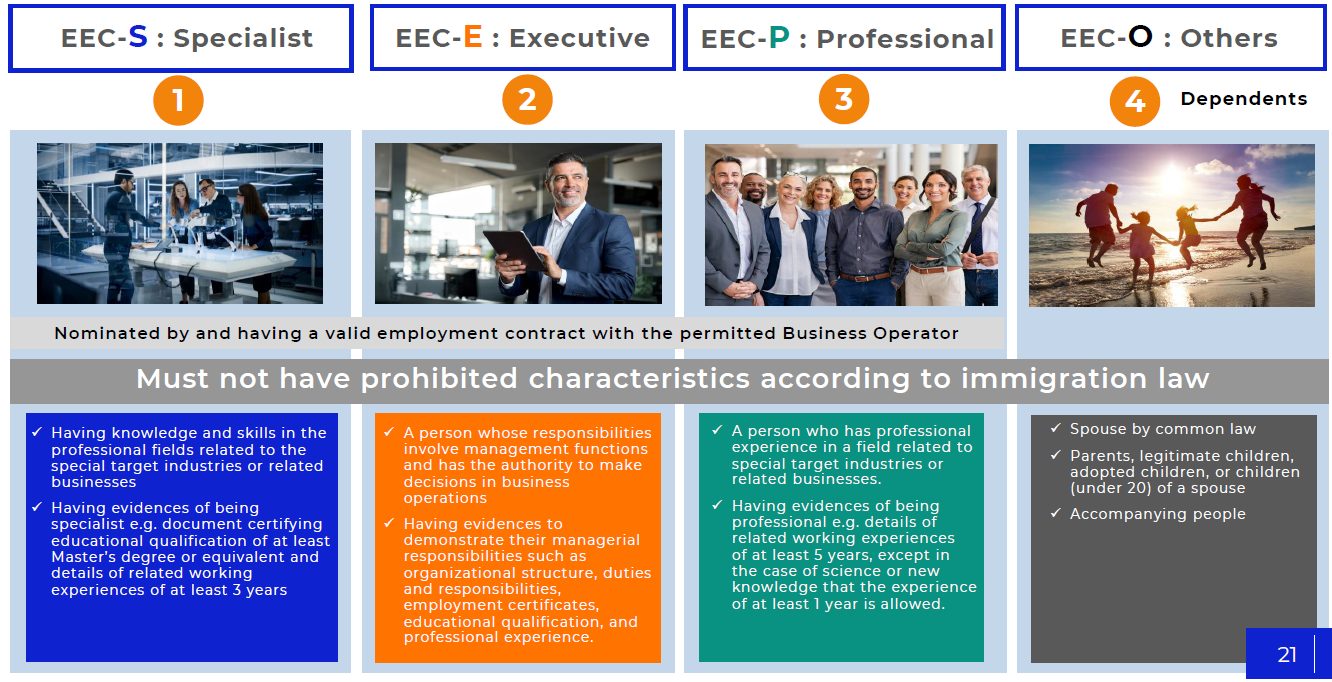
Scope and Privileges of EEC Visas
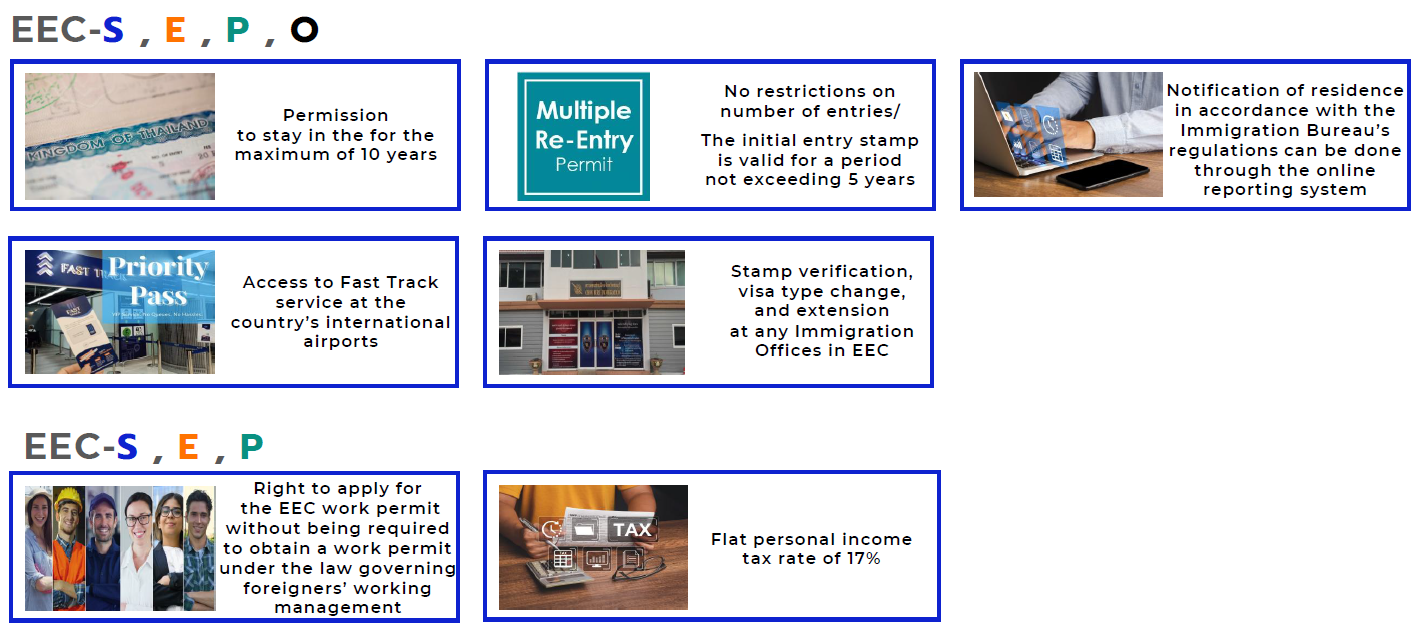
EEC Visas: Terms and Conditions
During their stay in Thailand, the annual minimum coverage for health insurance must be $50,000.
Applicants must comply with the standards, procedures, and conditions set by the Ministry of Interior, the Immigration Bureau, and other relevant government agencies.
If an Eastern Economic Corridor (EEC) visa holder is found to be non-compliant with the specified terms and conditions, the Secretary General of the Eastern Economic Corridor has the authority to revoke their residence permit and work permit in Thailand.
Steps to Apply for an EEC Visa
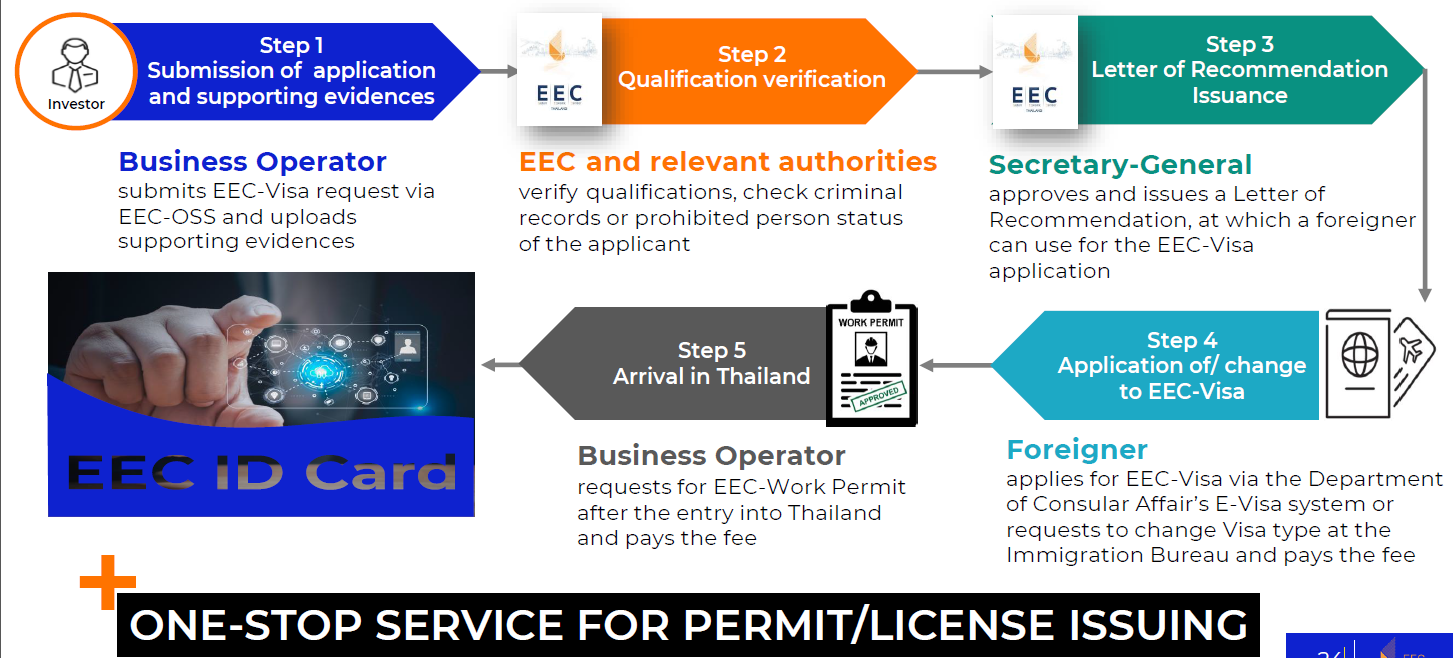
EEC Licensing and Permit Programs
List of Permits Directly Issued by the Eastern Economic Corridor Office (EECO)
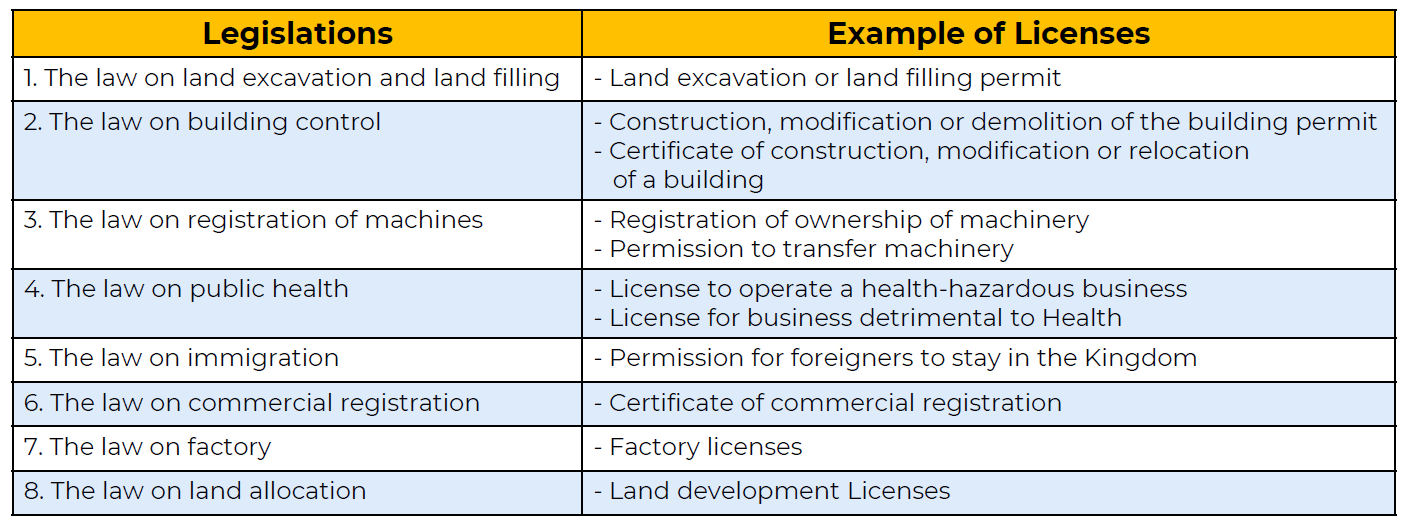
List of Permits Directly Issued by the EEC Policy Committee
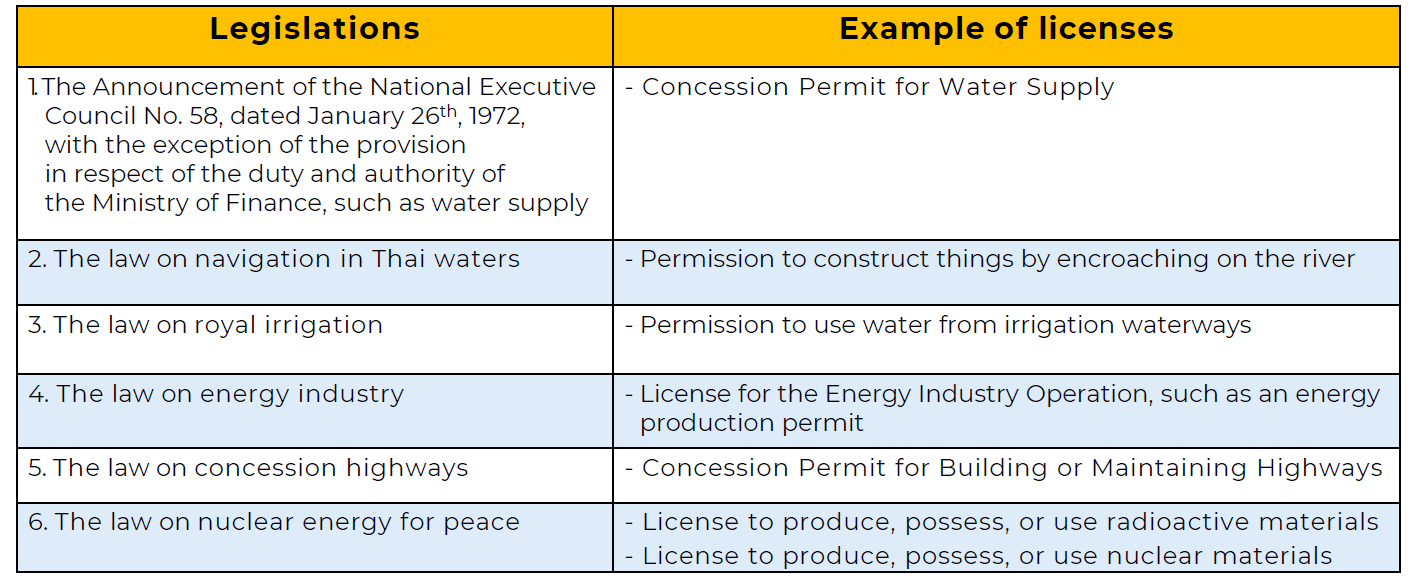 Establishment of the Eastern Economic Corridor Special Economic Promotion Zone (EEC-SEPZ)
Establishment of the Eastern Economic Corridor Special Economic Promotion Zone (EEC-SEPZ)
Steps to Establish the EEC-SEPZ
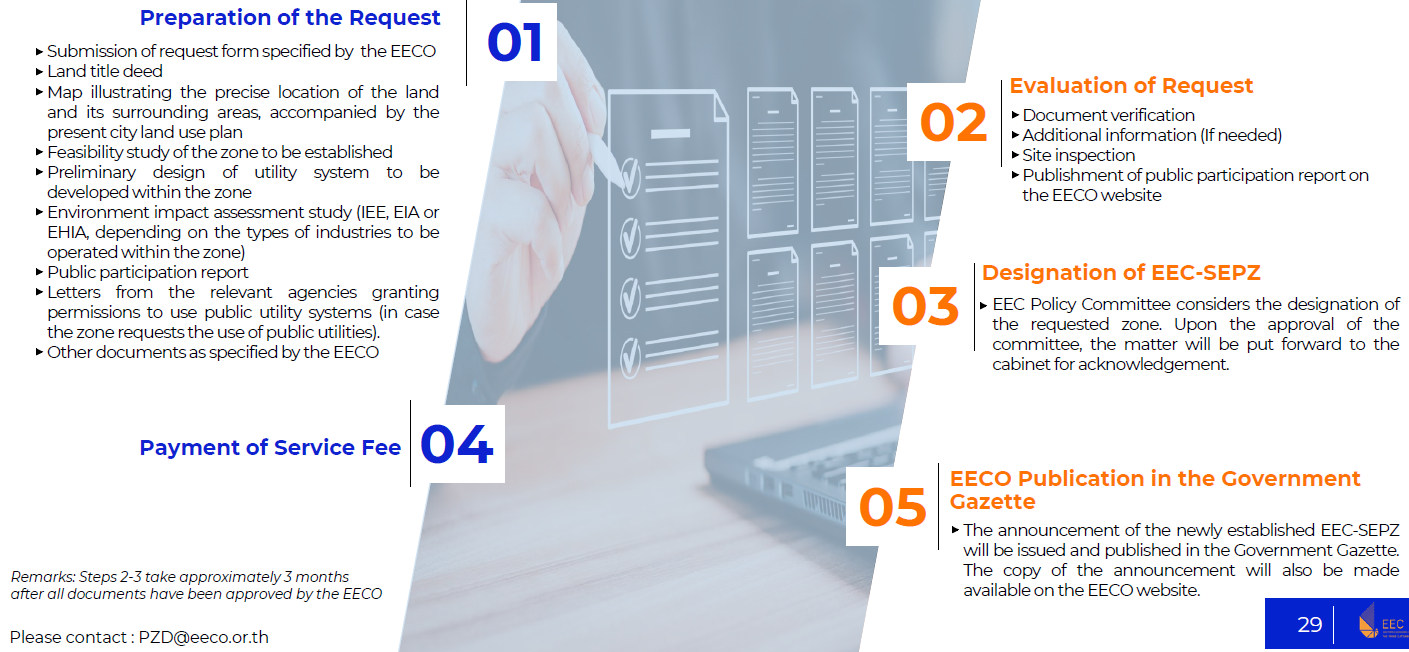
Contact Us EEC
We simplify the EEC process. Our professional team will guide you through the successful development of your investment project, providing advice, companionship, and support throughout the journey.
The Eastern Economic Corridor Office of Thailand (EECO) is a public institution dedicated to promoting investment, driving innovation, and advancing technological development, aiming to create a better future for generations to come. As your coordinator, we add value to your projects and work closely with the entire supply chain to ensure the success of your investment.
Contact Us We welcome any inquiries you may have. You can reach us through the following channels:
Eastern Economic Corridor Office
Address: 25th Floor, NT Tower, Wamangkai Alley, 72 Sathorn Road, Bangrak District, Bangkok, Thailand
Postal Code: 10500
Email: info@eeco.or.th or saraban@eeco.or.th
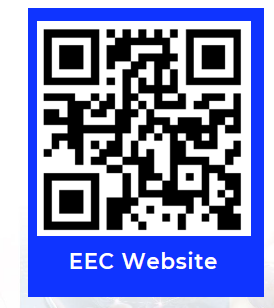
》Click to view the special report on the 2025 SMM (2nd) Southeast Asia Automotive Supply Chain Conference